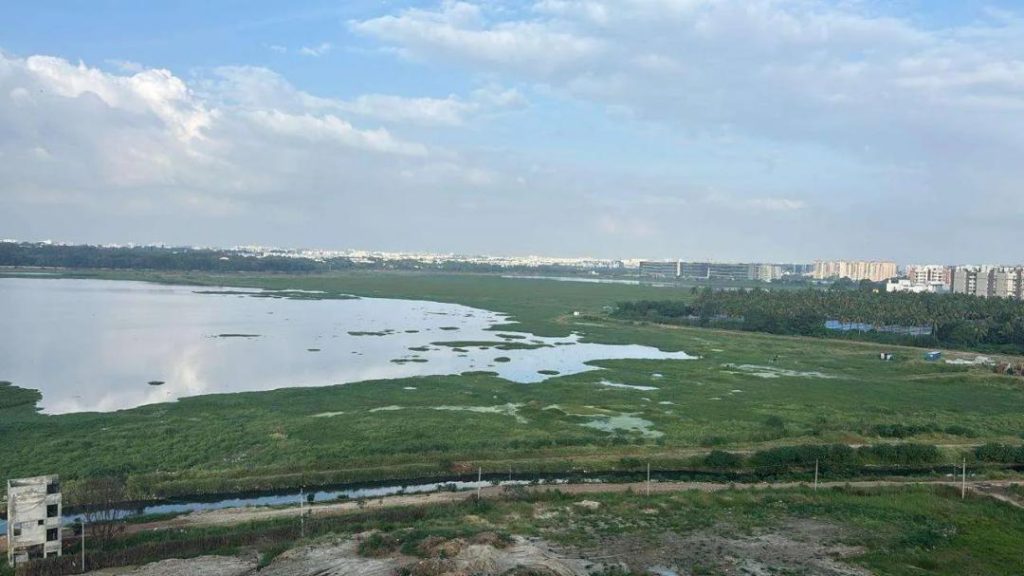
Karnataka’s Failed Deadlines and a Lake in Despair
Water bodies have always been an integral part of urban landscapes, providing a serene and natural oasis amidst the hustle and bustle of city life. Bengaluru, the Silicon Valley of India, is no exception. The city is home to numerous lakes and water bodies, which not only serve as a source of water but also contribute to the city’s aesthetic appeal. However, despite their importance, many of these water bodies in Bengaluru are in a state of despair, with the Bellandur Lake being a prime example.
The Bellandur Lake, located in the heart of Bengaluru, has seen a series of failed deadlines to rejuvenate and restore its ecosystem. The lake, which was once a popular spot for picnics and boating, has turned into a toxic soup of pollutants and waste. The lake’s condition is a stark reminder of the failure of the Karnataka government to meet its promises and deadlines to restore the lake.
The story of the Bellandur Lake’s decline began in the early 2000s when the lake’s water quality started to deteriorate due to the rapid urbanization and industrialization of the surrounding areas. The lake’s catchment area, which was once a lush green zone, was cleared to make way for high-rise buildings, apartments, and commercial complexes. This led to the lake’s water quality deteriorating further, with pollutants and waste flowing into the lake unchecked.
In 2014, the Karnataka government announced plans to rejuvenate the Bellandur Lake, promising to desilt the lake and improve its water quality. The project was supposed to be completed by 2017, but it was repeatedly delayed due to lack of funds and bureaucratic red tape. Despite several deadlines being missed, the lake’s condition continued to deteriorate, with the water quality becoming increasingly toxic.
In May 2024, the desilting work on the Bellandur Lake was stopped due to lack of funds. The Bangalore Development Authority (BDA) had been waiting for the government to allot funds for the project, but the government failed to do so. The BDA had estimated that the desilting work would cost around ₹30 crore, but the government had not provided any funds for the project.
The failure to rejuvenate the Bellandur Lake is not an isolated incident. The Karnataka government has a history of failing to meet its deadlines and promises when it comes to restoring water bodies in the state. In 2019, the state government had announced plans to rejuvenate the Ulsoor Lake, another popular water body in Bengaluru, but the project has been delayed repeatedly due to lack of funds and bureaucratic red tape.
The failure to rejuvenate the Bellandur Lake and other water bodies in Karnataka is not only an environmental issue but also a public health concern. The toxic water and pollution in the lake pose a serious risk to the health and wellbeing of the people living in the surrounding areas. The lake’s condition is also a major embarrassment for the government, which has failed to deliver on its promises and commitments to the people of Karnataka.
The story of the Bellandur Lake is a stark reminder of the importance of good governance and effective planning in managing urban water bodies. The lake’s condition is a result of the government’s failure to prioritize environmental issues and its inability to manage the city’s rapid growth and development.
In conclusion, the Bellandur Lake’s failed deadlines and poor condition are a reflection of the Karnataka government’s failure to prioritize environmental issues and manage the city’s rapid growth and development. The government’s inability to deliver on its promises and commitments has led to the lake’s condition deteriorating further, posing a serious risk to the health and wellbeing of the people living in the surrounding areas. It is high time for the government to take responsibility for its failures and take concrete steps to restore the lake and other water bodies in the state.






